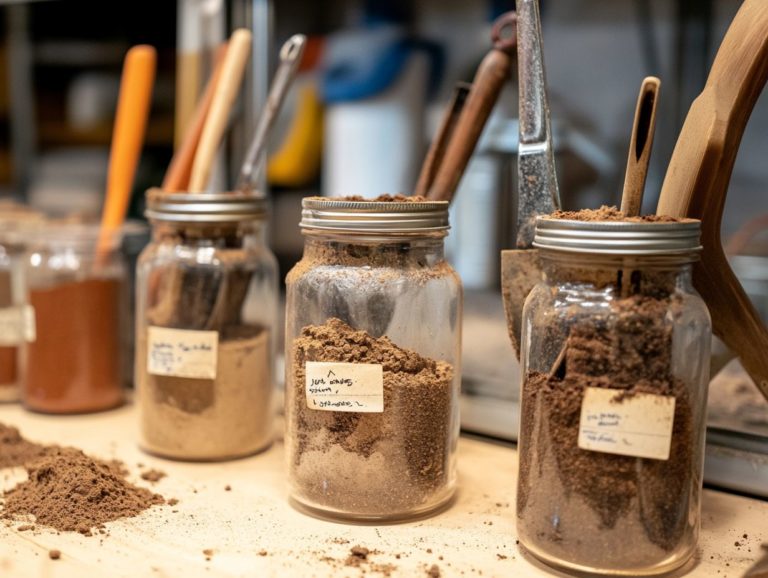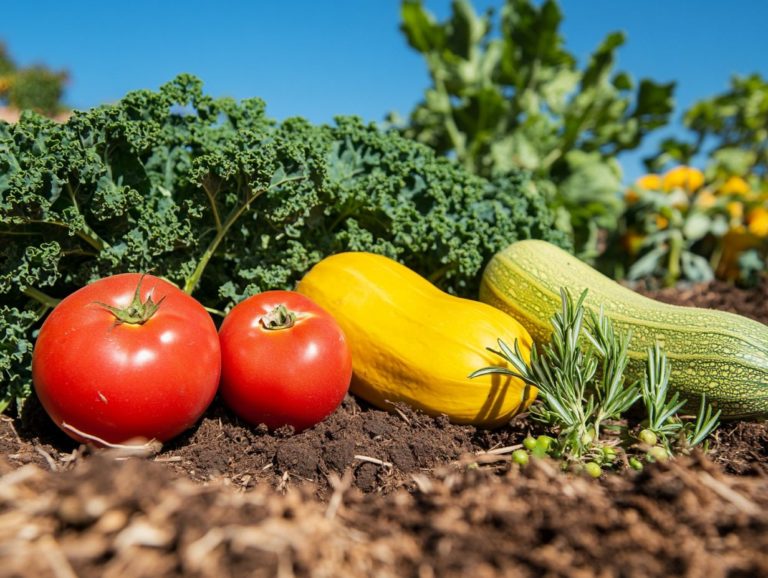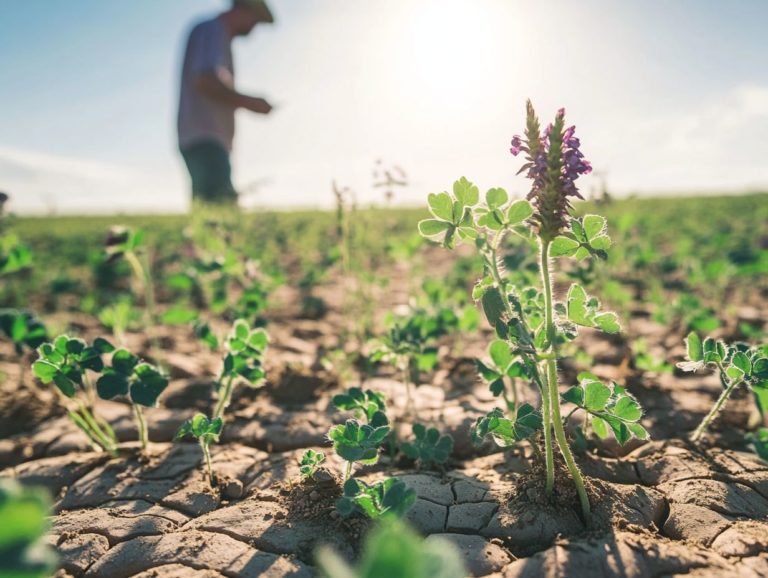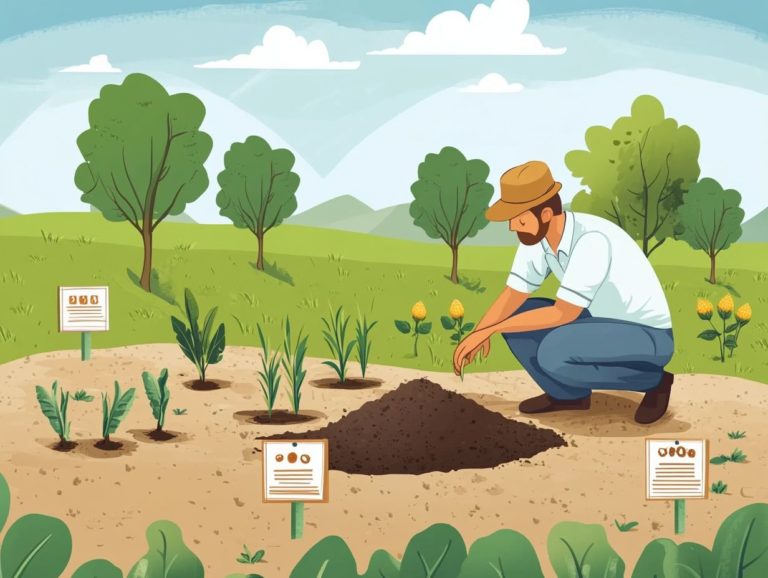The Importance of Soil Testing for Garden Success
Unlocking the secrets of your garden begins with grasping the foundation: the soil.
Soil testing is an essential practice that empowers you to evaluate the health and nutrient content of your soil. This sets the stage for vibrant, flourishing plants.
This article delves into what soil testing entails, the myriad benefits it offers for plant growth, and the optimal times to conduct tests. It also provides a detailed guide for performing your own analysis.
This article will help you interpret your results and make the necessary adjustments to nurture a thriving garden.
Discover how a bit of insight into your soil can pave the way for significant gardening success!
Contents
- Key Takeaways:
- What is Soil Testing?
- Benefits of Soil Testing for Gardeners
- When to Test Your Soil
- How to Test Your Soil
- Interpreting Soil Test Results
- Using Soil Test Results to Improve Your Garden
- Frequently Asked Questions
- Why is soil testing so important for my garden?
- How does soil testing help improve garden productivity?
- When is the best time to conduct a soil test for a garden?
- Can’t I just use store-bought fertilizers and skip soil testing?
- Is it necessary to test soil every year for a garden?
- Can I test my soil myself or should I hire a professional?
Key Takeaways:
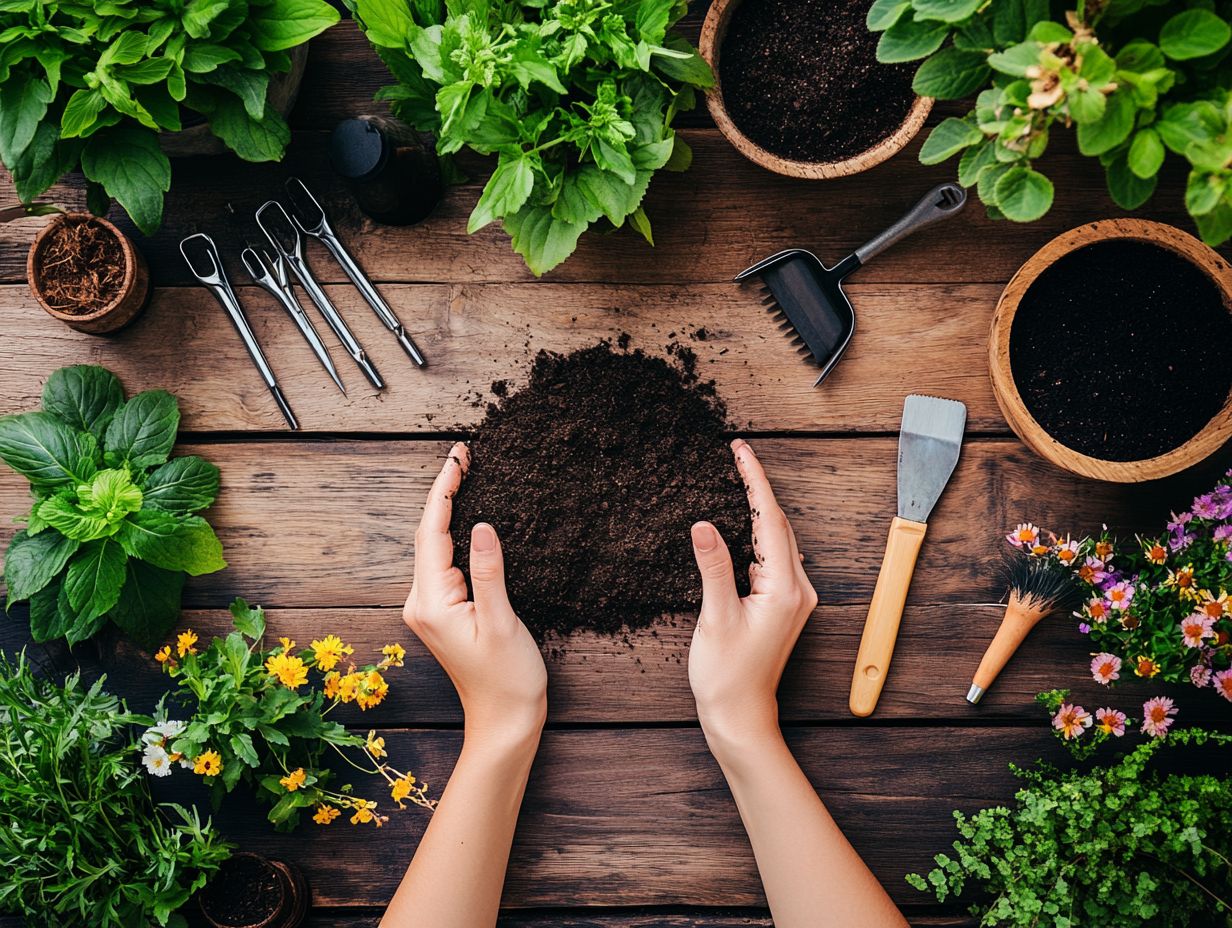
- Soil testing is a process that helps gardeners understand the health and nutrient levels of their soil, crucial for successful gardening.
- Regular soil testing can improve plant growth and health by providing necessary adjustments to nutrient levels and pH balance.
- Conducting a soil test at least once a year and following a step-by-step guide can help gardeners interpret and use their results effectively for a thriving garden.
What is Soil Testing?
Soil testing is an essential step in cultivating a thriving garden. It allows you to analyze your soil’s nutrient levels and overall composition, including the importance of soil pH testing.
By using soil analysis kits or sending samples to a reputable soil testing laboratory, you can uncover crucial insights into your soil’s health. This knowledge enables you to make informed decisions about necessary soil amendments and the best types of fertilizers to use.
Institutions such as Auburn University and local Extension services are invaluable resources. They offer precise testing services that enable you to optimize your growing environment, resulting in healthier plants and enhanced garden yields.
Defining the Process and Purpose
The process of soil testing requires you to collect samples from your garden. This allows for a thorough analysis of essential factors like nutrient levels and pH balance.
This vital practice begins with the meticulous gathering of soil samples from various spots in your garden. This ensures you have a well-rounded understanding of its condition.
Once you ve collected the samples, they re sent off to a laboratory where various analyses take place. Key elements such as big nutrients, small nutrients, and soil texture are assessed.
Each analysis is critical. For example, small nutrient analysis pinpoints those essential trace elements that your plants crave for optimal growth. Evaluations of nutrient levels reveal what amendments your soil might need.
Grasping these factors can profoundly influence plant health, leading to robust growth and improved yields.
Benefits of Soil Testing for Gardeners
Soil testing presents a wealth of advantages for you as a gardener. It enables you to pinpoint nutrient deficiencies, allowing you to enhance soil health effectively.
This, in turn, fosters the growth of vibrant plants and significantly boosts your garden yields.
Improving Plant Growth and Health
Make soil testing a must-do for your garden! It s the key to unlocking your plants full potential.
By conducting soil testing, you can significantly enhance plant growth and health. This ensures that your soil nutrient levels are balanced and conducive to optimal development.
This essential practice helps you identify specific nutrient deficiencies. It also guides you in selecting the most appropriate fertilizers and soil amendments tailored to your garden’s unique needs.
Understanding the existing soil moisture levels is crucial. It allows you to determine the right application rates for both water and nutrients.
With the insights gained from soil testing, cultivating your plants becomes a more focused endeavor. This leads to improved yields and robust plant health.
This proactive approach fosters a thriving garden ecosystem, where soil nutrients play a pivotal role in the successful growth of diverse plant species.
When to Test Your Soil
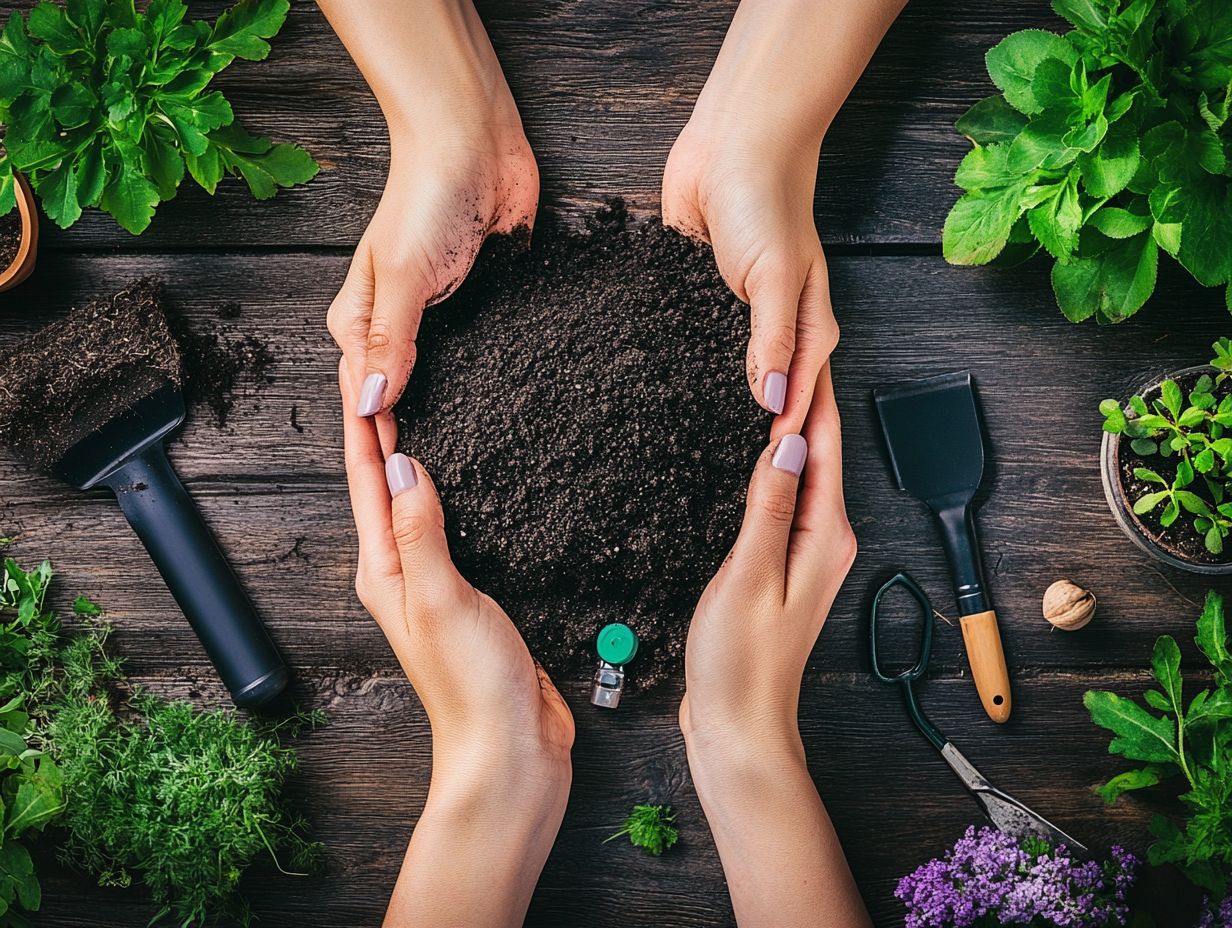
Understanding when to test your soil is essential for successful seasonal gardening and preserving the vitality of your garden. This knowledge enables you to make timely adjustments based on the test results.
This ensures your plants thrive throughout the growing season.
But when should you conduct these tests?
Don t wait! Test your soil today to ensure your garden thrives this season!
Recommended Testing Frequency
Testing your soil frequency depends on several key factors. These include the type of crops, composition of your soil, and your gardening practices.
If you re a vegetable gardener, test your soil at least once a year. This is especially important if you rotate crops or add organic materials.
For perennial plants, testing every two to three years is usually enough. Their nutrient needs tend to stabilize over time.
Testing in early spring allows you to adjust nutrient levels before planting. This sets the stage for healthier growth.
By understanding your local soil pH and nutrient content, you can make informed decisions about fertilizers and amendments, ensuring your plants receive the optimal support for robust growth.
How to Test Your Soil
You can test your soil effectively using a soil sample kit or by opting for professional soil testing services. This approach offers you a clear, step-by-step guide to obtain precise and reliable results.
Step-by-Step Guide to Conducting a Soil Test
To conduct a successful soil test, start by gathering a soil sample kit and adopting a systematic approach for collecting and analyzing your soil.
Select various areas of your garden to ensure you re getting a representative sample. Using a clean spade or garden trowel, dig down about six inches to collect your samples. Combine them into a clean container while removing any roots or stones.
Once you ve got your composite sample, check the soil moisture. A quick touch will tell you if it feels slightly damp but not drenched. This moisture level is crucial as it impacts the chemistry and biology of your soil.
If the sample is too wet, dry it out before sending it off to a soil testing laboratory for thorough analysis. The lab will evaluate key factors such as pH levels, nutrient content, and soil composition. This will help you tailor effective gardening techniques specifically suited to your needs.
Interpreting Soil Test Results
Interpreting soil test results is crucial for understanding nutrient levels and pH balance, as these factors directly influence the growth and health of your plants.
Understanding this information enables you to make informed decisions that can significantly enhance your gardening success.
Understanding Nutrient Levels and pH Balance
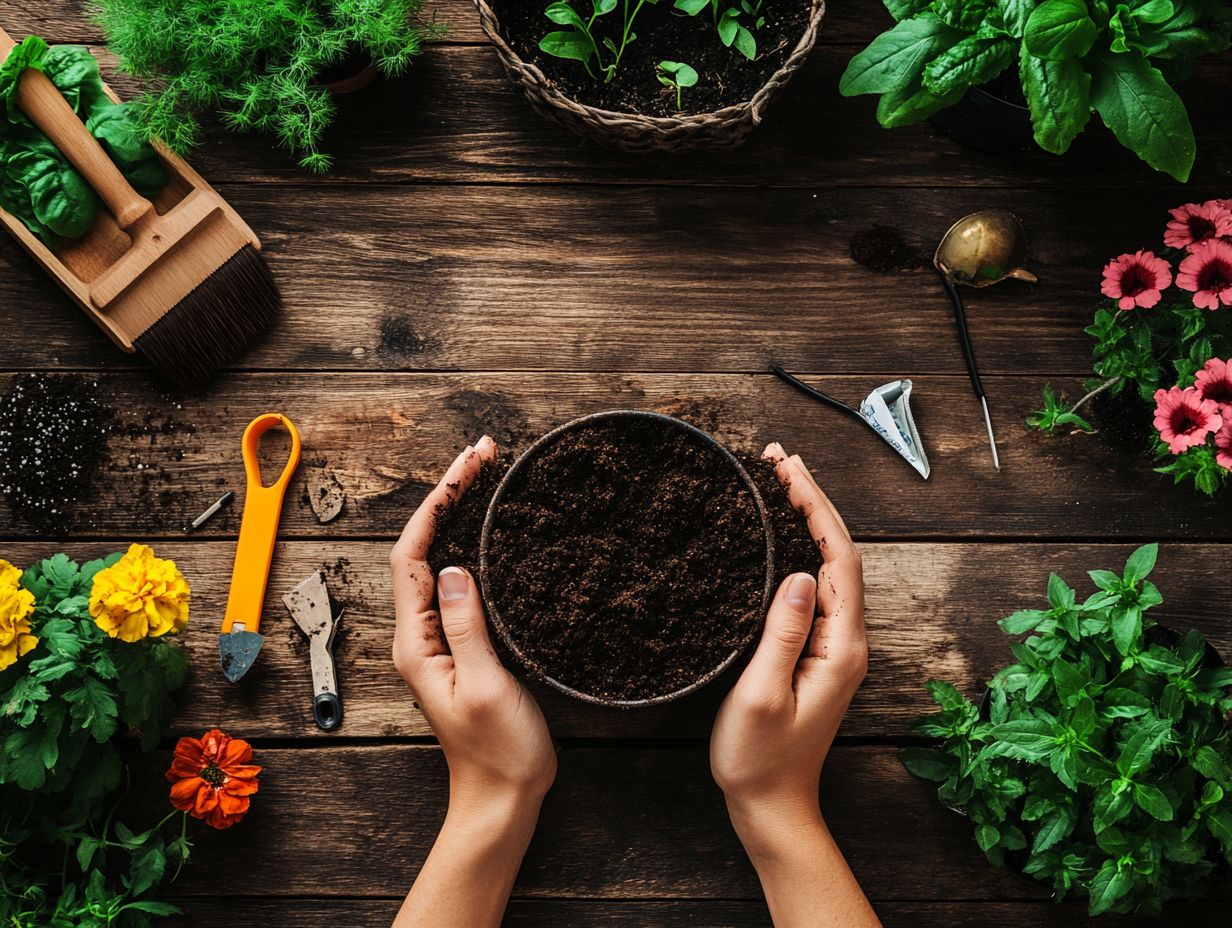
Understanding nutrient levels and pH balance is essential for you as a gardener. It enables you to address any lack of nutrients and ensure that soil conditions are ideal for plant growth.
These factors dictate how effectively your plants can absorb vital minerals. They also influence the microbial activity in the soil, which is crucial for breaking down organic matter.
When soil tests reveal specific nutrient deficiencies, like nitrogen or phosphorus, you can take targeted actions to amend the soil. Practices such as fertilization or adding compost can be very effective.
Maintaining the right pH level ideally between 6.0 and 7.5 ensures that nutrients are readily available to your plants. If the soil’s pH drifts too high or too low, nutrients can become locked away, leading to stunted growth or increased susceptibility to disease.
By grasping these dynamics, you can develop more effective gardening strategies that promote healthy, thriving plants.
Using Soil Test Results to Improve Your Garden
Effectively utilizing soil test results can lead to remarkable enhancements in your garden. By allowing for precise adjustments in nutrient levels and the strategic use of soil amendments, you can cultivate a thriving, productive environment for your plants.
Adjusting Nutrient Levels and pH for Optimal Plant Growth
Adjusting nutrient levels and balancing pH in your soil is crucial. This creates an environment that promotes optimal plant growth and health.
As a gardener, you might use specific methods to achieve this balance by employing soil amendments like agricultural lime and compost. Agricultural lime is particularly adept at raising pH levels in acidic soils. Meanwhile, compost enriches your soil s nutrient profile, enhancing its structure and improving water retention.
You can also use organic materials, such as well-rotted manure or green manure cover crops, to boost the soil with vital micronutrients. Regularly testing your soil s pH with simple home kits or professional services allows you to make precise adjustments. This ensures your plants can absorb nutrients effectively.
By embracing organic gardening principles, you nurture healthier plants and contribute to a thriving ecosystem.
Frequently Asked Questions
Why is soil testing so important for my garden?
Soil testing reveals nutrient levels, pH, and soil texture. This information is key for nurturing vibrant plants!
How does soil testing help improve garden productivity?
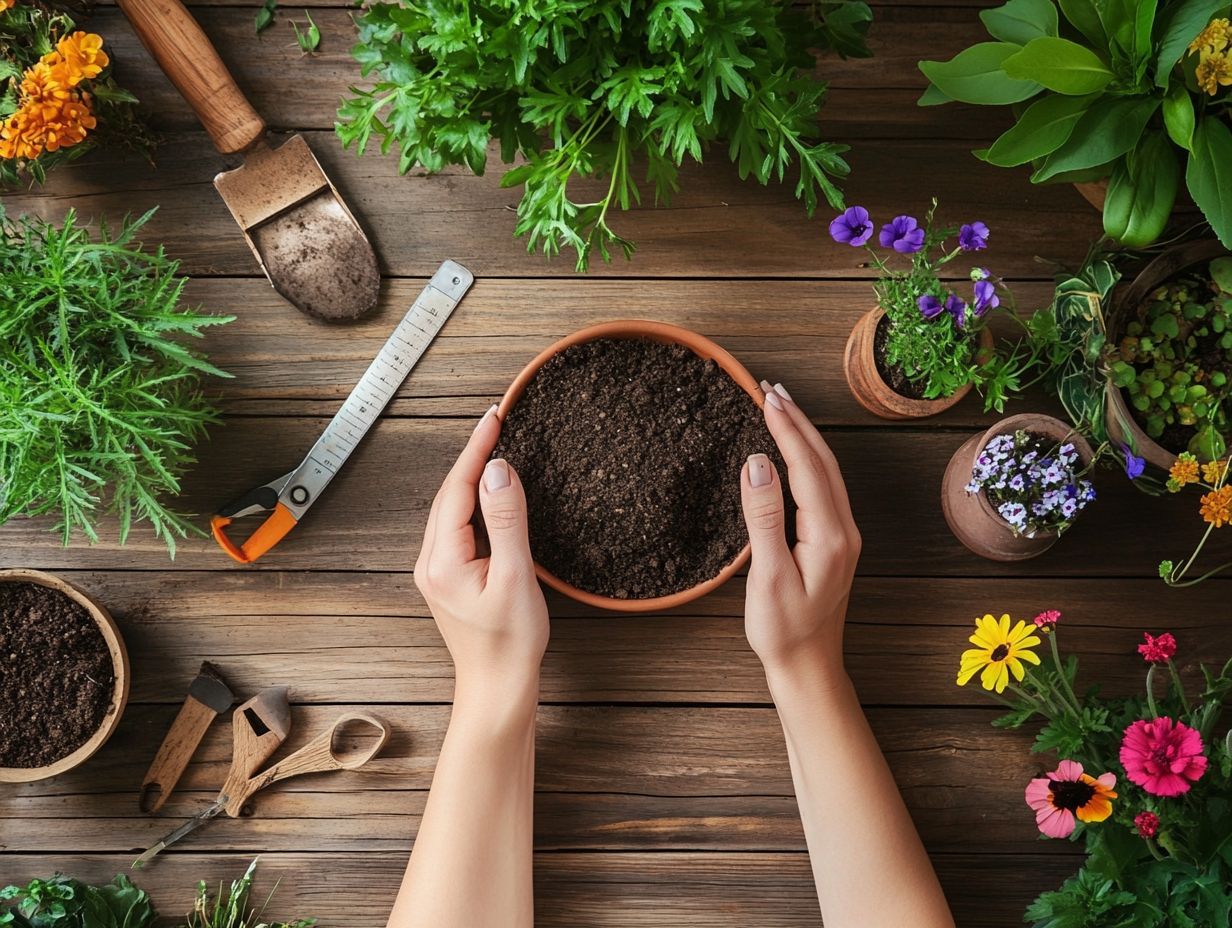
By identifying deficiencies or excesses in nutrients, soil testing allows you to make necessary amendments. This results in healthier plants, improved root development, and higher yields in your garden.
When is the best time to conduct a soil test for a garden?
The best time to conduct a soil test is in early spring before seasonal planting or after the growing season ends. This timing allows you to make necessary adjustments before planting or during the soil’s resting period.
Can’t I just use store-bought fertilizers and skip soil testing?
While fertilizers can provide nutrients to your plants, they do not address imbalances or deficiencies in the soil. Soil testing ensures that the right types of fertilizers and amendments are used, saving you time and money in the long run.
Is it necessary to test soil every year for a garden?
It is recommended to test your soil every 2-3 years for a vegetable or flower garden, especially with organic practices. However, if you notice changes in plant growth or poor yields, such as nutrient deficiencies, it may be beneficial to test more frequently.
Can I test my soil myself or should I hire a professional?
You can purchase at-home soil testing kits, often referred to as soil sample kits, but they may not provide accurate results. It is best to hire a professional soil testing service, such as your local Extension office or soil testing laboratory. They have the necessary equipment and expertise to analyze your soil accurately.

